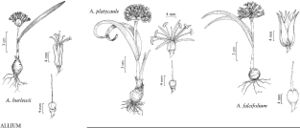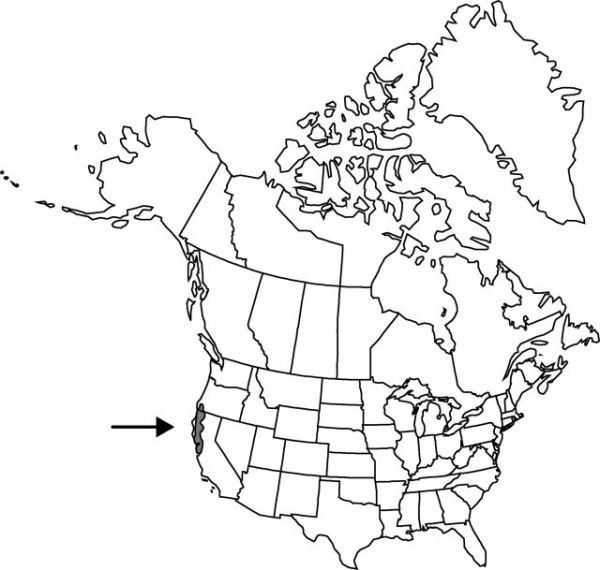Difference between revisions of "Allium falcifolium"
Bot. Beechey Voy., 400. 1841.
FNA>Volume Importer |
imported>Volume Importer |
||
| (5 intermediate revisions by 2 users not shown) | |||
| Line 6: | Line 6: | ||
|place=400. 1841 | |place=400. 1841 | ||
|year=1841 | |year=1841 | ||
| + | }} | ||
| + | |special_status={{Treatment/ID/Special_status | ||
| + | |code=F | ||
| + | |label=Illustrated | ||
| + | }}{{Treatment/ID/Special_status | ||
| + | |code=E | ||
| + | |label=Endemic | ||
}} | }} | ||
|basionyms= | |basionyms= | ||
| Line 11: | Line 18: | ||
|name=Allium breweri | |name=Allium breweri | ||
|authority=S. Watson | |authority=S. Watson | ||
| + | |rank=species | ||
}} {{Treatment/ID/Synonym | }} {{Treatment/ID/Synonym | ||
|name=Allium falcifolium var. breweri | |name=Allium falcifolium var. breweri | ||
|authority=(S. Watson) M. E. Jones | |authority=(S. Watson) M. E. Jones | ||
| + | |rank=variety | ||
}} | }} | ||
|hierarchy=Liliaceae;Allium;Allium falcifolium | |hierarchy=Liliaceae;Allium;Allium falcifolium | ||
| Line 37: | Line 46: | ||
-->{{#Taxon: | -->{{#Taxon: | ||
name=Allium falcifolium | name=Allium falcifolium | ||
| − | |||
|authority=Hooker & Arnott | |authority=Hooker & Arnott | ||
|rank=species | |rank=species | ||
| Line 51: | Line 59: | ||
|publication title=Bot. Beechey Voy., | |publication title=Bot. Beechey Voy., | ||
|publication year=1841 | |publication year=1841 | ||
| − | |special status= | + | |special status=Illustrated;Endemic |
| − | |source xml=https:// | + | |source xml=https://bitbucket.org/aafc-mbb/fna-data-curation/src/2e0870ddd59836b60bcf96646a41e87ea5a5943a/coarse_grained_fna_xml/V26/V26_522.xml |
|genus=Allium | |genus=Allium | ||
|species=Allium falcifolium | |species=Allium falcifolium | ||
Latest revision as of 21:15, 5 November 2020
Bulbs 1–5+, not clustered on stout primary rhizomes, rhizomes absent, increase bulbs absent or ± equaling parent bulbs, never appearing as basal cluster, ovoid, 1.5–2.5 × 1–1.8 cm; outer coats enclosing renewal and increase bulbs, brown to reddish brown, membranous, lacking cellular reticulation or cells arranged in only 2–3 rows distal to roots, ± quadrate, without fibers; inner coats white or pink, cells obscure, ± quadrate. Leaves usually deciduous with scape, withering from tip at anthesis, 2, basally sheathing, sheaths not extending much above soil surface; blade solid, flat, falcate, 8–21 cm × 2–8 mm, margins entire. Scape usually forming abcission layer and deciduous with leaves after seeds mature, frequently breaking at this level after pressing, solitary, erect, solid, strongly flattened, winged distally, 5–25 cm × 1–4 mm. Umbel persistent, erect, compact to ± loose, 10–30-flowered, hemispheric, bulbils unknown; spathe bracts persistent, 2, 6–9-veined, lanceolate, ± equal, apex acuminate. Flowers conic to campanulate, 9–15 mm; tepals erect, reddish purple or dingy white, lanceolate, ± equal, rigid and membranous in fruit, at least inner margins denticulate with minute glands, apex long-acuminate; stamens included; anthers purple or yellow; pollen yellow or white; ovary crested; processes 3, central, low, rounded, broad, margins entire; style linear, equaling stamens; stigma capitate, unlobed; pedicel 8–15 mm. Seed coat dull; cells ± smooth. 2n = 14.
Phenology: Flowering Apr–Jun.
Habitat: Heavy, rocky, clay soils, including serpentine
Elevation: 100–2100 m
Discussion
Selected References
None.

